Head over heels, Bob Pickard, a former employee of the investment bank AIIB, fled China this week. The Canadian accuses the financial institution, founded by China in 2016, of being firmly in the hands of the Communist Party and ultimately serving only Beijing’s interests. AIIB critics have long voiced this suspicion.
The Canadian government reacted to the allegations by the former Director Global Communications of the Investment Bank and has now frozen all activities with the AIIB. Finance Minister Chrystia Freeland urges the world’s democracies to be aware of the ways in which authoritarian governments exert influence over them.
Canada is only one of 106 members of the AIIB. Germany also has a stake in the bank. It holds the most voting rights after China, Russia and India, at around four percent. Marcel Grzanna looks at what the controversy means for Germany.
The EU Commission could soon use its anti-dumping instruments against the import of low-cost Chinese EVs. Cheap imports, which also enter the market faster and faster, become a growing problem for the EU’s industry, explains Commissioner for Internal Market Thierry Breton.
But even such tariffs will not change the underlying problems. For one, China can continue to leverage numerous price advantages on its domestic and world market, as Finn Mayer-Kuckuk, Markus Grabitz and Till Hoppe reveal in their analysis. On the other hand, Chinese cars have already surpassed German carmakers in many areas when it comes to technological finesse. Tariff protection alone will not make German industry faster, better or more advanced.

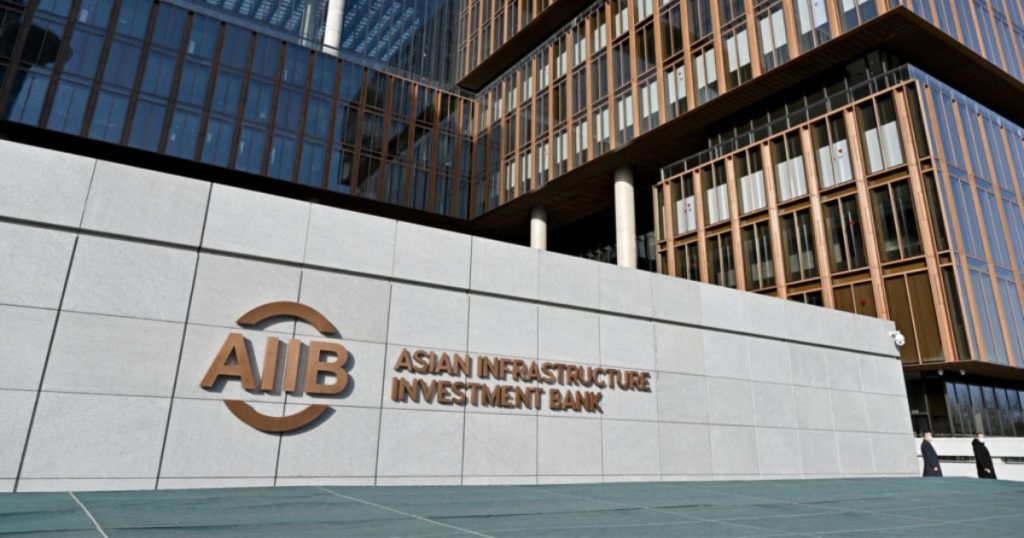
The escape from the People’s Republic of China of a senior Canadian ex-employee of the Asian Infrastructure Investment Bank (AIIB) raises new questions about the institution’s role (AIIB). Global Communications Director Bob Pickard apparently took the advice of a whistleblower that he should leave the country as soon as possible and “not set foot in China anytime soon.” Pickard confirmed to Reuters that he then immediately left for Japan.
Pickard apparently resigned earlier this week. It was only afterward that he was advised to leave. The Canadian justified his resignation by saying that there was a highly “toxic culture” at AIIB and that members of the Communist Party dominated the bank. “I feel the taxpayers of my country should not be financing this organisation which in the end will be of more benefit to China than any benefit to Canada,” he said.
Within the Bank, Beijing has “interfered with our ability to clearly and transparently communicate,” Pickard said. Canada is one of 106 members of the bank. The country became a member in March 2018. In the meantime, AIIB dismissed the allegations as “baseless and disappointing.” The Chinese embassy in Ottawa accused Pickard of “lying.”
Germany also holds a stake in the bank. Germany has the most voting rights after China, Russia and India, with around four percent. The German government, however, reacted cautiously to the report. The responsible Federal Ministry of Finance only stated: “AIIB President Jin announced an investigation into the allegations immediately after they became known and assured full transparency and cooperation with the Executive Board. Germany will actively participate in the investigation.”
The escalation might even lead to Canada’s withdrawal from the AIIB. “The Government of Canada will immediately halt all government-led activity at the bank. And I have instructed the Department of Finance to lead an immediate review of the allegations raised and of Canada’s involvement in the AIIB,” said Finance Minister Chrystia Freeland. She stressed that she was not ruling out any outcome of the investigation. Freeland warned the world’s democracies to be aware of the ways in which authoritarian governments exert their influence.
Pickard did not reveal who advised him to flee. But he did say why he followed the advice. “From a country where the two Michaels were kidnapped by the government, we’re maybe a little more sensitive or concerned about such things,” he said, referring to the cases of two Canadian citizens, Michael Kovrig and Michael Spavor, who were imprisoned for years for alleged espionage.
Relations between the two countries have been at rock bottom for years. Among other things, Canada accuses China of interfering in Canadian affairs through various measures, including illegal police stations and targeting Canadian lawmakers. Beijing denies these accusations.
China, for its part, resents the government in Canada for the fact that Ottawa held Huawei CFO Meng Wanzhou in the country for years for investigative purposes at the insistence of the US. The subsequent detentions of Kovrig and Spavor were perceived in the West as retaliation for Meng.
Nora Sausmikat from the non-profit organization Urgewald in Cologne is a senior advisor responsible for campaigns on institutions like the AIIB: “For years we have been hearing from the European shareholders of the AIIB that they have hardly any influence and therefore positive changes are hardly possible. If the European voting group joined forces, they would have a combined share of 22 percent – quite a decision-making power.”
But instead, the power to make decisions at AIIB is said to be delegated to the president and thus into the hands of the main Chinese shareholders. Sufficient oversight by the board of directors would not be guaranteed. “Only recently, at a meeting in Rome, many of the European shareholders affirmed that they did not see a problem with this. It is time to wake up,” says Sausmikat.
In a recent interview with China.Table, Ludger Schuknecht, the German Vice President of AIIB, emphasized that the bank attaches great importance to the consensus of all members. However, AIIB has already come under criticism in the recent past for questionable lending procedures. The German government also examined its involvement in the bank after the state development bank KfW withdrew as a donor. Berlin wants to work towards ensuring that the “high credit standards of the AIIB” are implemented in accordance with the bank’s regulations.
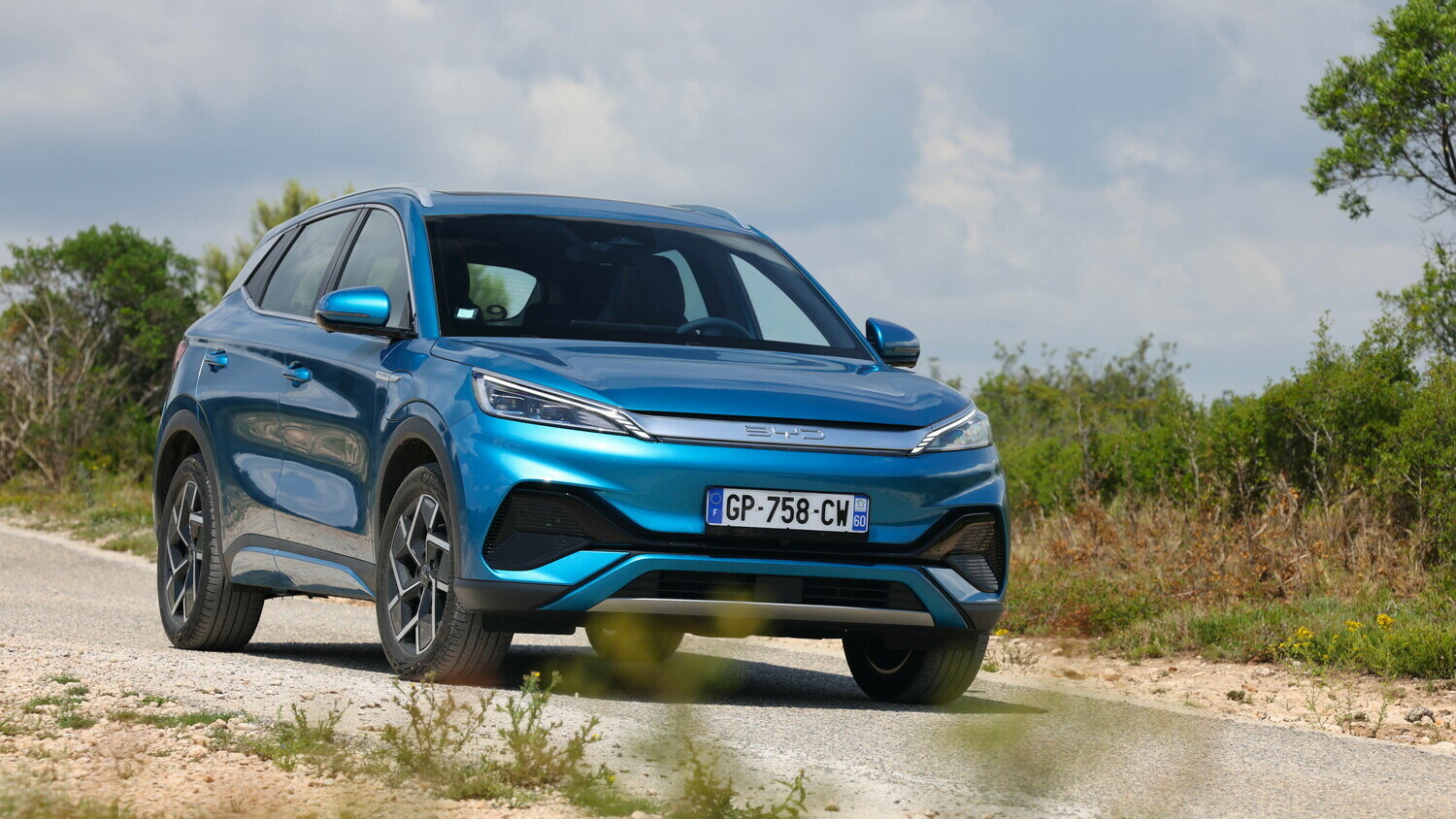
The EU Commission could use its anti-dumping tools against the import of cheap EVs from China. The rapid rise of imports is becoming a problem for the EU’s industry, Internal Market Commissioner Thierry Breton told Politico. The responsible Directorate-General for Trade, Denis Redonnet, reportedly discusses launching proceedings against suppliers that can be accused of selling products at excessively low prices. A spokeswoman of the EU Commission refused to comment on the matter.
The French government, in particular, is putting pressure on the Commission, it is heard from Brussels. Paris fears competition for its volume manufacturers, Stellantis and Renault. The German government, on the other hand, is acting more cautiously. A spokesperson for Economy Minister Robert Habeck referred to the EU regulations for anti-dumping procedures, which provide for “a regulated decision-making and implementation procedure.” The EU modernized its methodology in 2017 precisely because of the challenges posed by China’s state capitalism.
Without well-founded complaints from the European manufacturers, the Directorate-General for Trade will hardly initiate proceedings against the Chinese manufacturers. The Chair of the European Parliament’s committee on International Trade, Bernd Lange, does not see “sufficient evidence for this at the moment. A large part of the added value is created by the batteries, which are used almost identically by European manufacturers,” the social democrat told Table.Media. Moreover, hardly any reliable figures show that Chinese EV prices are significantly lower than those of European suppliers. In addition, their market penetration in Europe has been low so far, he added.
In contrast, industry observers report that Chinese EV manufacturers have been targeting the French market for about one to two years. Especially the volume manufacturers with brands such as Peugeot, Renault, Fiat and Seat registered that Chinese manufacturers were calling for “predatory pricing.” The MG4 Electric – a family-friendly four-seater by the Chinese manufacturer SAIC with a range of more than 400 kilometers – is being sold in France for prices comparable to the smaller Renault Zoe. The equivalent all-electric Mégane from Renault costs 5,000 to 10,000 euros more.
The French government is already discussing plans to change the EV subsidy. For example, a premium of up to 6,000 euros could only be granted if the steel was processed using sustainable methods and the electricity used to produce the car had a demonstrably low CO2 footprint. Ecological standards should also apply to the production of batteries. The idea is not to openly discriminate against Chinese-made cars and, at the same time, reward European manufacturers’ more ecologically demanding methods.
Manufacturers refrain from making any official comments. But this cannot hide the fact that French and German manufacturers have different interests. German premium brands are still reaping high profits from sales of internal combustion vehicles in Asia. They fear that China would immediately retaliate if EU punitive tariffs were imposed. On the other hand, they would hardly benefit from protective tariffs on the European market because Chinese EVs are no competition for them. At Renault or Stellantis, the opposite is true.
According to the EU definition, grounds for a reaction to dumping exist if
Regardless of whether it is dumping or simply low prices: The concern about a flood of attractive Chinese cars is justified. An EV is as much an electronics product as a vehicle. Therefore, the rules of the electronics industry apply to a large extent. Large-scale production of electronics tends to be cheaper in China. This applies to mobile phones, screens, solar cells, batteries, PCs, game consoles, cameras – and in the future, also to cars.
There are several reasons for the Chinese cost advantages:
Moreover, China produces very decent cars for a reasonable price. Domestic manufacturers have recently not only caught up with German carmakers in terms of technology but have even overtaken them in some cases. This is especially true for the digital technology of cars. While Germany’s engineers were still fine-tuning connecting rods and pistons, the focus in China was already on integrating apps into the four-wheeled smart device.
As far as passenger safety and a smooth driving experience are concerned, China’s manufacturers had several decades to pick up all the tricks from leaders in Germany, Japan or the USA. After all, they were required to manufacture in joint ventures with Chinese partners, which allowed for a regulated technology transfer.
The numbers have long reflected the volume advantage of the Chinese market. The largest Chinese manufacturer BYD sold a total of 900,000 pure electric cars last year. That is already a tenth of the total production (electric and fossil) of world market leader Toyota. VW achieved sales of 570,000 purely battery-powered cars.
Other Chinese challengers are also interesting because of their new concepts:
A study by Allianz sees the Chinese challengers as the greatest risk to European carmakers. Stellantis CEO Carlos Tavares expects a “terrible fight” with the Chinese competition and calls for state aid against their aggressive prices.
But even tariffs will not change the fundamental problem that China can exploit numerous price advantages on its domestic market and the world market. Even if the US follows suit, Germany and Europe’s industries have a price problem in large parts of the world. Finn Mayer-Kuckuk/Markus Grabitz/Till Hoppe
June 20, 2023; 10 a.m. CEST (4 p.m. CST)
stars – for Leaders of the Next Generation, conversation series: China-EU Relations: Beijing’s View on Challenges and Opportunities (with Fu Cong) More
EU Internal Market Commissioner Thierry Breton has once again called on EU member states to exclude high-risk providers when rolling out their 5G telecommunication networks. Breton specifically referred to the two Chinese companies Huawei and ZTE. He said that The EU Commission would no longer use services that involve technology from ZTE or Huawei in the future.
Breton urged all EU countries and telecommunications operators to take necessary measures without delay. He said the EU has managed to reduce dependencies in other sectors, such as energy, in a very short time. “The situation with 5G should be no different,” Breton said. “We cannot afford to maintain critical dependencies that could become a ‘weapon’ against our interests.”
On Thursday, Breton presented a progress report on the extent to which the member states have so far implemented the principles from the toolbox adopted in 2020 into national law. The report showed that only ten member states had introduced such restrictions. Three member states are currently working on the implementation of the corresponding national legislation.
Breton called the decision by some EU countries to limit the influence of Huawei and ZTE on their 5G networks, or even to exclude them from them altogether, justified. The EU cannot issue an EU-wide ban on providers like Huawei and ZTE from China, as Table.Media previously reported. Because dealing with high-risk providers is a matter of national security – and thus a matter for individual member states, not the EU. That is why the Commission and the NIS Cooperation Group, with representatives of the member states had limited themselves to recommendations. vis
Youth unemployment in China continues to rise, reaching a new record high in May. The rate, which looks at 16-24-year-olds in urban areas, rose from 20.4 percent in April to 20.8 percent in May. This is four times higher than the unemployment rate for the total population, which is unchanged at 5.2 percent. This is according to data released by the National Statistics Office on Thursday, Bloomberg reported.
More than 33 million young people have recently entered the job market and more than six million are currently unemployed, NBS spokesperson Fu Linghui said at a press conference on Thursday. In total, China has about 96 million 16- to 24-year-olds. Many of them are not looking for work because they are still in school, Fu said.
According to estimates by economists at Goldman Sachs, three million more young people are unemployed today than before the pandemic. It has been at a high level since the beginning of 2022, as the pandemic and the real estate market slump have exacerbated the existing structural problems in the job market. cyb
Siemens plans to increase the capacity of its automation plant in Chengdu by 40 percent. The technology group earmarked 140 million euros for this. At the same time, it wants to become less dependent on China by investing in Singapore, among other places.
The company plans to invest an additional two billion euros this year, primarily in new plants. “We are currently seeing very good growth in all areas and want to accelerate once again,” CEO Roland Busch told the German business newspaper Handelsblatt.
Last fall, it became known that Siemens was planning to invest heavily in China under the project name “Marco Polo.” The company plans to double its digital sales by 2025. In order to avoid becoming overly dependent on the People’s Republic, however, the production in China will primarily be for the Chinese market. The company wants to expand its capacities in other countries. Among other things, investments of 200 million euros are planned in a new automation plant in Singapore. “We want to serve the strong demand in Southeast Asia from here,” said Busch. India is “really on a roll” at the moment, he said, and demand is also high in markets such as Thailand and Vietnam. cyb
A week after the protest anthem “Glory to Hong Kong” reached the top of the local iTunes charts, it is no longer available on various music streaming services. Among others, it vanished from iTunes, Spotify, KKBox in Taiwan and Moov in Hong Kong. The Department of Justice in Hong Kong had previously announced that it would consider banning the song. This gave the song a popularity boost. A ban would represent another step towards eroding freedom of speech in the city.
On Wednesday, tracks posted by “ThomasDGX & HongKongers” – presumably the song’s composer – were no longer available on Apple Music, but a version by Taiwanese band The Chairman remained available, Bloomberg reported. On Thursday, Spotify announced its distributor had removed versions of the controversial song, not the platform itself, according to the South China Morning Post. This is in line with a statement made by the song’s composer the night before.
Protesters sang the song during pro-democracy demonstrations in the city in 2019. The Special Administrative Region does not have an official anthem. “ThomasDGX & HongKongers,” who had posted the missing versions, explained that they were technical problems unrelated to the streaming platforms and apologized for the temporary interruption. The exact nature of the problems remained unclear. Several music videos of “Glory to Hong Kong” uploaded by the same creator were still available on YouTube. cyb

The “Great Green Wall,” a more than 4000-kilometer-long protective wall against soil erosion in northern China planted in 1978, is an ecological success story. So is the reforestation of agricultural land by converting fields into forests and meadows (退耕还林还草).
Beijing’s campaign of reforesting vast areas of arable land (退耕还林) started in 1999, recalls Gao Juncai (高俊才), one of the top agricultural officials under Premier Zhu Rongqi. It was prompted by China’s disastrous floods of 1998 after the causes were identified to be erosion and economic depletion of the natural environment. The gigantic program was unusually successful and continued for almost 20 years.
According to national forestry authorities, by the end of 2021, more than 41 million farmers and 158 million herders in 22 provinces had compensated 551.5 billion yuan for the restoration of millions of hectares of cropland and pastureland.
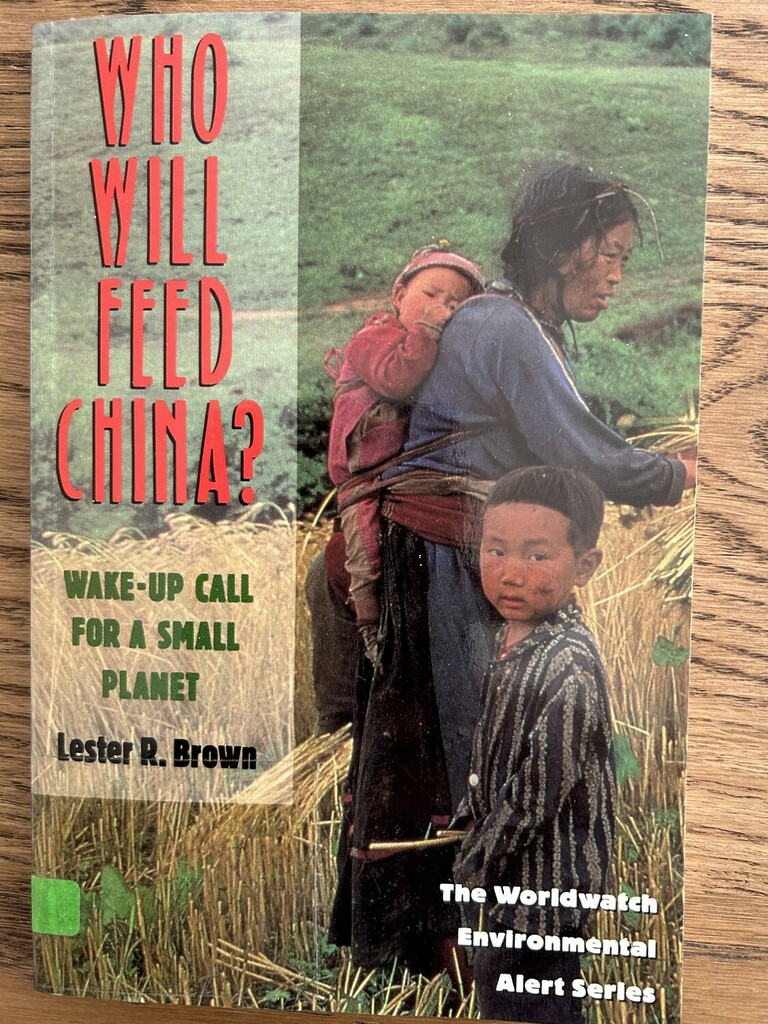
But this was about to end: Since 2020, Xi Jinping has been trying to take countermeasures, demanding the reversal of parts of the reforestation and turning forests into many fields again. The CCP leader is plagued by fears about the nation’s food security and the five percent decline in arable land below China’s “red line” of 120 million hectares of agricultural land.
But on his latest inspection trip to the desert-threatened Inner Mongolia, Xi again changed his mind. But why this zigzag?
For the past two years, Manoj Kewalramani, an Indian expert on China, has been helping to decipher the gibberish of the “People’s Newspaper.” He analyzes it daily in his newsletter. The sinologist not only understands the art of reading between the lines. He also notices which Chinese sentences the official English Xinhua translation omits.
One example is June 7. On that day, the CCP newspaper devoted its front page to Xi Jinping’s remarks during his inspection tour of Inner Mongolia. He visited it on behalf of China’s major regions in the north and northwest (三北), which are particularly suffering from deserts and droughts.
The official People’s Newspaper report opened with its usual propagandistic tone. Xi called the fight against erosion a “huge success admired around the world” (取得举世瞩目的巨大成就). The “change has shaken heaven and earth.” (翻天覆地的变化). The “desert sand that forced people to retreat” had been “driven away by reforestation” (从 “沙进人退 “到 “绿进沙退 “的历史性转变).
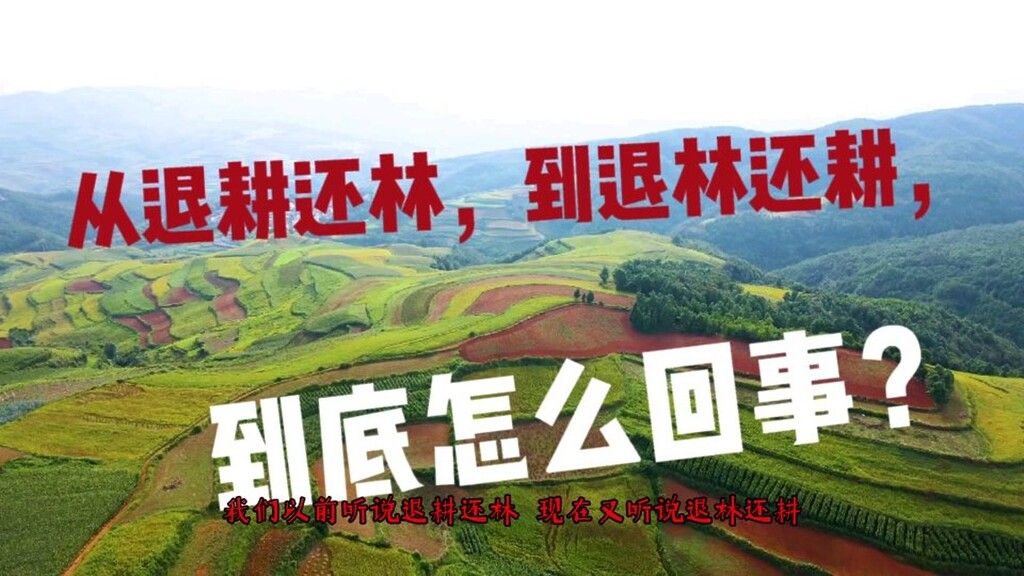
But what he really experienced taught him otherwise. China remains one of the countries in the world “with the worst deserts.” The “ecological disaster” was a “challenge to the survival and development of China’s nation” (对中华民族的生存、发展构成挑战). What is needed, he said, is another ten years of hard work to build an “indestructible great green wall as an ecological security barrier.”
In other words, Xi admitted failure for the first time. He also explained why his verdict was so sobering. However, these sentences are missing from the official English translation. Xi said: “In the past two years, due to the abnormal influence of climate change, the number of sandstorms in northern China has increased. The reality shows us how bad prevention and control still are.” (这两年,受气候变化异常影响,我国北方沙尘天气次数有所增加。现实表明,我国荒漠化防治和防沙治沙工作形势依然严峻). He said China must continue to focus on ecological priorities and reforest and green agricultural land. So he indirectly reversed his policy change of 2020.
Xi’s fear that China is threatened by a food emergency has caught up with him. In 2013, he said there was not enough trade grain in the world to feed China’s hunger in the event of an agricultural crisis, and his fear only grew after China’s relations with the United States deteriorated dramatically. Since 2020, he has warned that “the world is facing major transformations like none in a century.” In Xi’s strategic thinking, self-sufficiency takes on a new dimension because of China’s dependence on US agricultural imports (grain, soybeans, corn), particularly since Putin’s invasion of Ukraine, once a large supplier of grain, corn, and sunflower oil for China. “We need to avoid the US cutting us off” (防着美国卡中国脖子).
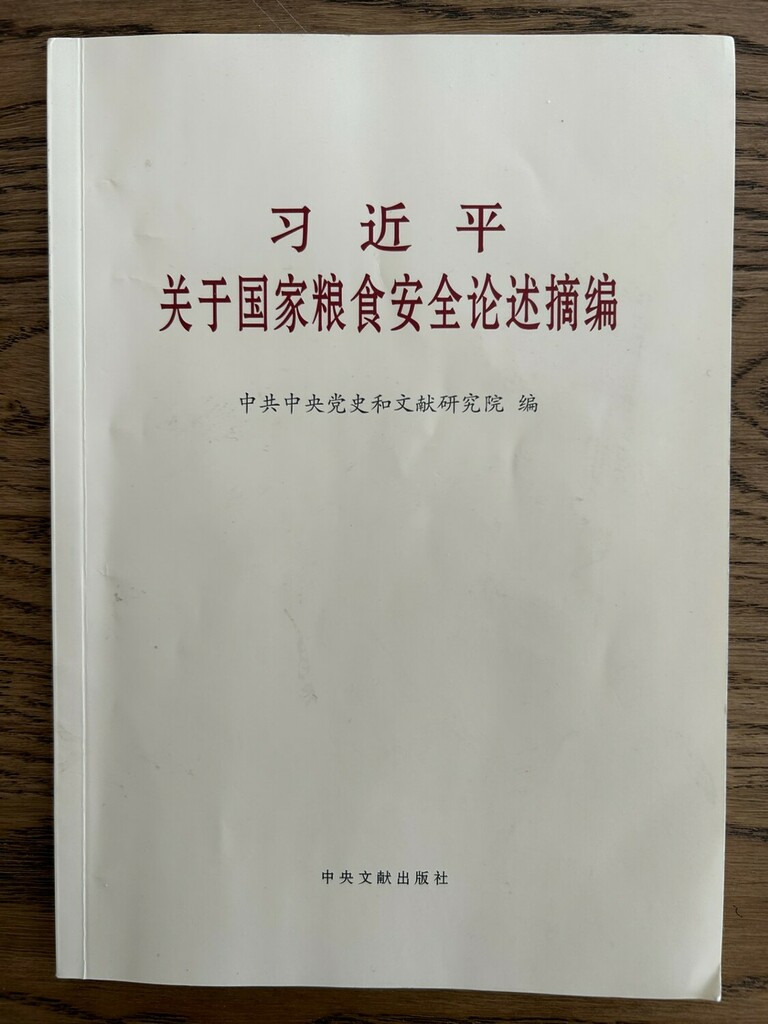
Longtime Nikkei correspondent Katsuji Nakazawa also points to China’s military buildup and the Taiwan conflict. All this forces Beijing to secure ample food reserves.
Even reports of China’s new record harvests do not satisfy Xi. On December 23, 2022, he demanded: “Although we have harvested more than 650 million tons of grain every year for the past eight years, it is getting harder; we need to increase yields by another 50 million tons of grain.” Promptly, three months later, outgoing Premier Li Keqiang cited the new benchmark in his final report to the People’s Congress: China’s grain yield must grow by 50 million tons annually. This would be achieved by securing the cultivation area.

This is precisely what Xi had in mind when he first called for forests to be converted back into fields. On December 28, 2020, he called protecting farmland as important as “protecting panda bears.” He said China’s total arable land shall be no less than 1.8 billion mu. Yet “some areas are creating fields, forests, fishponds and ornamental ponds for tourism. Or are converting dozens to hundreds of meters of shoulders along roads, railroads and riverbanks previously used for cultivation into greenbelts.”
Since the beginnings of Beijing’s campaign to reforest large amounts of farmland in 1999 – first enacted in response to floods on the Yangtze River – China’s greened areas have so far doubled; in the ten years under Xi Jinping’s rule from 2012 to 2022 alone, some 200,000 square kilometers of new forests, woodlands and plantations have been planted, nearly twice the size of South Korea.
Now the will of autocrat Xi dictates to undo everything – or perhaps not. Xi just justified his change of heart regarding reforestation by saying that “reality” (现实表明) forces him to do so. Maybe his insight is not limited to the particular case of Inner Mongolia but also re-evaluates the “other realities” he sacrificed to his ideological maxims.
Maike Jungblut has been Manager Controlling at Mercedes-Benz Cars China since June. Jungblut joined Daimler more than six years ago. She gained experience in Asia as a student in Taoyuan and Guangzhou, among other places.
Yue Yan has taken over the post of China Market Development Manager at Ferag AG. The Swiss company specializes in conveying and processing systems.
Is something changing in your organization? Let us know at heads@table.media!

The 100-day countdown to the 19th Asian Games began Thursday in Hangzhou, eastern China. At the flame lighting ceremony, dancers interpreted a sun worship of the Neolithic Liangzhu culture, which is believed to have existed in the region between 3,400 and 2,000 B.C. and is considered proof of China’s continuity as a cultural nation. The logo of the Asian Games is a red sun emitting 16 flames, representing Asia as the sunrise in the East of the world.
Head over heels, Bob Pickard, a former employee of the investment bank AIIB, fled China this week. The Canadian accuses the financial institution, founded by China in 2016, of being firmly in the hands of the Communist Party and ultimately serving only Beijing’s interests. AIIB critics have long voiced this suspicion.
The Canadian government reacted to the allegations by the former Director Global Communications of the Investment Bank and has now frozen all activities with the AIIB. Finance Minister Chrystia Freeland urges the world’s democracies to be aware of the ways in which authoritarian governments exert influence over them.
Canada is only one of 106 members of the AIIB. Germany also has a stake in the bank. It holds the most voting rights after China, Russia and India, at around four percent. Marcel Grzanna looks at what the controversy means for Germany.
The EU Commission could soon use its anti-dumping instruments against the import of low-cost Chinese EVs. Cheap imports, which also enter the market faster and faster, become a growing problem for the EU’s industry, explains Commissioner for Internal Market Thierry Breton.
But even such tariffs will not change the underlying problems. For one, China can continue to leverage numerous price advantages on its domestic and world market, as Finn Mayer-Kuckuk, Markus Grabitz and Till Hoppe reveal in their analysis. On the other hand, Chinese cars have already surpassed German carmakers in many areas when it comes to technological finesse. Tariff protection alone will not make German industry faster, better or more advanced.


The escape from the People’s Republic of China of a senior Canadian ex-employee of the Asian Infrastructure Investment Bank (AIIB) raises new questions about the institution’s role (AIIB). Global Communications Director Bob Pickard apparently took the advice of a whistleblower that he should leave the country as soon as possible and “not set foot in China anytime soon.” Pickard confirmed to Reuters that he then immediately left for Japan.
Pickard apparently resigned earlier this week. It was only afterward that he was advised to leave. The Canadian justified his resignation by saying that there was a highly “toxic culture” at AIIB and that members of the Communist Party dominated the bank. “I feel the taxpayers of my country should not be financing this organisation which in the end will be of more benefit to China than any benefit to Canada,” he said.
Within the Bank, Beijing has “interfered with our ability to clearly and transparently communicate,” Pickard said. Canada is one of 106 members of the bank. The country became a member in March 2018. In the meantime, AIIB dismissed the allegations as “baseless and disappointing.” The Chinese embassy in Ottawa accused Pickard of “lying.”
Germany also holds a stake in the bank. Germany has the most voting rights after China, Russia and India, with around four percent. The German government, however, reacted cautiously to the report. The responsible Federal Ministry of Finance only stated: “AIIB President Jin announced an investigation into the allegations immediately after they became known and assured full transparency and cooperation with the Executive Board. Germany will actively participate in the investigation.”
The escalation might even lead to Canada’s withdrawal from the AIIB. “The Government of Canada will immediately halt all government-led activity at the bank. And I have instructed the Department of Finance to lead an immediate review of the allegations raised and of Canada’s involvement in the AIIB,” said Finance Minister Chrystia Freeland. She stressed that she was not ruling out any outcome of the investigation. Freeland warned the world’s democracies to be aware of the ways in which authoritarian governments exert their influence.
Pickard did not reveal who advised him to flee. But he did say why he followed the advice. “From a country where the two Michaels were kidnapped by the government, we’re maybe a little more sensitive or concerned about such things,” he said, referring to the cases of two Canadian citizens, Michael Kovrig and Michael Spavor, who were imprisoned for years for alleged espionage.
Relations between the two countries have been at rock bottom for years. Among other things, Canada accuses China of interfering in Canadian affairs through various measures, including illegal police stations and targeting Canadian lawmakers. Beijing denies these accusations.
China, for its part, resents the government in Canada for the fact that Ottawa held Huawei CFO Meng Wanzhou in the country for years for investigative purposes at the insistence of the US. The subsequent detentions of Kovrig and Spavor were perceived in the West as retaliation for Meng.
Nora Sausmikat from the non-profit organization Urgewald in Cologne is a senior advisor responsible for campaigns on institutions like the AIIB: “For years we have been hearing from the European shareholders of the AIIB that they have hardly any influence and therefore positive changes are hardly possible. If the European voting group joined forces, they would have a combined share of 22 percent – quite a decision-making power.”
But instead, the power to make decisions at AIIB is said to be delegated to the president and thus into the hands of the main Chinese shareholders. Sufficient oversight by the board of directors would not be guaranteed. “Only recently, at a meeting in Rome, many of the European shareholders affirmed that they did not see a problem with this. It is time to wake up,” says Sausmikat.
In a recent interview with China.Table, Ludger Schuknecht, the German Vice President of AIIB, emphasized that the bank attaches great importance to the consensus of all members. However, AIIB has already come under criticism in the recent past for questionable lending procedures. The German government also examined its involvement in the bank after the state development bank KfW withdrew as a donor. Berlin wants to work towards ensuring that the “high credit standards of the AIIB” are implemented in accordance with the bank’s regulations.

The EU Commission could use its anti-dumping tools against the import of cheap EVs from China. The rapid rise of imports is becoming a problem for the EU’s industry, Internal Market Commissioner Thierry Breton told Politico. The responsible Directorate-General for Trade, Denis Redonnet, reportedly discusses launching proceedings against suppliers that can be accused of selling products at excessively low prices. A spokeswoman of the EU Commission refused to comment on the matter.
The French government, in particular, is putting pressure on the Commission, it is heard from Brussels. Paris fears competition for its volume manufacturers, Stellantis and Renault. The German government, on the other hand, is acting more cautiously. A spokesperson for Economy Minister Robert Habeck referred to the EU regulations for anti-dumping procedures, which provide for “a regulated decision-making and implementation procedure.” The EU modernized its methodology in 2017 precisely because of the challenges posed by China’s state capitalism.
Without well-founded complaints from the European manufacturers, the Directorate-General for Trade will hardly initiate proceedings against the Chinese manufacturers. The Chair of the European Parliament’s committee on International Trade, Bernd Lange, does not see “sufficient evidence for this at the moment. A large part of the added value is created by the batteries, which are used almost identically by European manufacturers,” the social democrat told Table.Media. Moreover, hardly any reliable figures show that Chinese EV prices are significantly lower than those of European suppliers. In addition, their market penetration in Europe has been low so far, he added.
In contrast, industry observers report that Chinese EV manufacturers have been targeting the French market for about one to two years. Especially the volume manufacturers with brands such as Peugeot, Renault, Fiat and Seat registered that Chinese manufacturers were calling for “predatory pricing.” The MG4 Electric – a family-friendly four-seater by the Chinese manufacturer SAIC with a range of more than 400 kilometers – is being sold in France for prices comparable to the smaller Renault Zoe. The equivalent all-electric Mégane from Renault costs 5,000 to 10,000 euros more.
The French government is already discussing plans to change the EV subsidy. For example, a premium of up to 6,000 euros could only be granted if the steel was processed using sustainable methods and the electricity used to produce the car had a demonstrably low CO2 footprint. Ecological standards should also apply to the production of batteries. The idea is not to openly discriminate against Chinese-made cars and, at the same time, reward European manufacturers’ more ecologically demanding methods.
Manufacturers refrain from making any official comments. But this cannot hide the fact that French and German manufacturers have different interests. German premium brands are still reaping high profits from sales of internal combustion vehicles in Asia. They fear that China would immediately retaliate if EU punitive tariffs were imposed. On the other hand, they would hardly benefit from protective tariffs on the European market because Chinese EVs are no competition for them. At Renault or Stellantis, the opposite is true.
According to the EU definition, grounds for a reaction to dumping exist if
Regardless of whether it is dumping or simply low prices: The concern about a flood of attractive Chinese cars is justified. An EV is as much an electronics product as a vehicle. Therefore, the rules of the electronics industry apply to a large extent. Large-scale production of electronics tends to be cheaper in China. This applies to mobile phones, screens, solar cells, batteries, PCs, game consoles, cameras – and in the future, also to cars.
There are several reasons for the Chinese cost advantages:
Moreover, China produces very decent cars for a reasonable price. Domestic manufacturers have recently not only caught up with German carmakers in terms of technology but have even overtaken them in some cases. This is especially true for the digital technology of cars. While Germany’s engineers were still fine-tuning connecting rods and pistons, the focus in China was already on integrating apps into the four-wheeled smart device.
As far as passenger safety and a smooth driving experience are concerned, China’s manufacturers had several decades to pick up all the tricks from leaders in Germany, Japan or the USA. After all, they were required to manufacture in joint ventures with Chinese partners, which allowed for a regulated technology transfer.
The numbers have long reflected the volume advantage of the Chinese market. The largest Chinese manufacturer BYD sold a total of 900,000 pure electric cars last year. That is already a tenth of the total production (electric and fossil) of world market leader Toyota. VW achieved sales of 570,000 purely battery-powered cars.
Other Chinese challengers are also interesting because of their new concepts:
A study by Allianz sees the Chinese challengers as the greatest risk to European carmakers. Stellantis CEO Carlos Tavares expects a “terrible fight” with the Chinese competition and calls for state aid against their aggressive prices.
But even tariffs will not change the fundamental problem that China can exploit numerous price advantages on its domestic market and the world market. Even if the US follows suit, Germany and Europe’s industries have a price problem in large parts of the world. Finn Mayer-Kuckuk/Markus Grabitz/Till Hoppe
June 20, 2023; 10 a.m. CEST (4 p.m. CST)
stars – for Leaders of the Next Generation, conversation series: China-EU Relations: Beijing’s View on Challenges and Opportunities (with Fu Cong) More
EU Internal Market Commissioner Thierry Breton has once again called on EU member states to exclude high-risk providers when rolling out their 5G telecommunication networks. Breton specifically referred to the two Chinese companies Huawei and ZTE. He said that The EU Commission would no longer use services that involve technology from ZTE or Huawei in the future.
Breton urged all EU countries and telecommunications operators to take necessary measures without delay. He said the EU has managed to reduce dependencies in other sectors, such as energy, in a very short time. “The situation with 5G should be no different,” Breton said. “We cannot afford to maintain critical dependencies that could become a ‘weapon’ against our interests.”
On Thursday, Breton presented a progress report on the extent to which the member states have so far implemented the principles from the toolbox adopted in 2020 into national law. The report showed that only ten member states had introduced such restrictions. Three member states are currently working on the implementation of the corresponding national legislation.
Breton called the decision by some EU countries to limit the influence of Huawei and ZTE on their 5G networks, or even to exclude them from them altogether, justified. The EU cannot issue an EU-wide ban on providers like Huawei and ZTE from China, as Table.Media previously reported. Because dealing with high-risk providers is a matter of national security – and thus a matter for individual member states, not the EU. That is why the Commission and the NIS Cooperation Group, with representatives of the member states had limited themselves to recommendations. vis
Youth unemployment in China continues to rise, reaching a new record high in May. The rate, which looks at 16-24-year-olds in urban areas, rose from 20.4 percent in April to 20.8 percent in May. This is four times higher than the unemployment rate for the total population, which is unchanged at 5.2 percent. This is according to data released by the National Statistics Office on Thursday, Bloomberg reported.
More than 33 million young people have recently entered the job market and more than six million are currently unemployed, NBS spokesperson Fu Linghui said at a press conference on Thursday. In total, China has about 96 million 16- to 24-year-olds. Many of them are not looking for work because they are still in school, Fu said.
According to estimates by economists at Goldman Sachs, three million more young people are unemployed today than before the pandemic. It has been at a high level since the beginning of 2022, as the pandemic and the real estate market slump have exacerbated the existing structural problems in the job market. cyb
Siemens plans to increase the capacity of its automation plant in Chengdu by 40 percent. The technology group earmarked 140 million euros for this. At the same time, it wants to become less dependent on China by investing in Singapore, among other places.
The company plans to invest an additional two billion euros this year, primarily in new plants. “We are currently seeing very good growth in all areas and want to accelerate once again,” CEO Roland Busch told the German business newspaper Handelsblatt.
Last fall, it became known that Siemens was planning to invest heavily in China under the project name “Marco Polo.” The company plans to double its digital sales by 2025. In order to avoid becoming overly dependent on the People’s Republic, however, the production in China will primarily be for the Chinese market. The company wants to expand its capacities in other countries. Among other things, investments of 200 million euros are planned in a new automation plant in Singapore. “We want to serve the strong demand in Southeast Asia from here,” said Busch. India is “really on a roll” at the moment, he said, and demand is also high in markets such as Thailand and Vietnam. cyb
A week after the protest anthem “Glory to Hong Kong” reached the top of the local iTunes charts, it is no longer available on various music streaming services. Among others, it vanished from iTunes, Spotify, KKBox in Taiwan and Moov in Hong Kong. The Department of Justice in Hong Kong had previously announced that it would consider banning the song. This gave the song a popularity boost. A ban would represent another step towards eroding freedom of speech in the city.
On Wednesday, tracks posted by “ThomasDGX & HongKongers” – presumably the song’s composer – were no longer available on Apple Music, but a version by Taiwanese band The Chairman remained available, Bloomberg reported. On Thursday, Spotify announced its distributor had removed versions of the controversial song, not the platform itself, according to the South China Morning Post. This is in line with a statement made by the song’s composer the night before.
Protesters sang the song during pro-democracy demonstrations in the city in 2019. The Special Administrative Region does not have an official anthem. “ThomasDGX & HongKongers,” who had posted the missing versions, explained that they were technical problems unrelated to the streaming platforms and apologized for the temporary interruption. The exact nature of the problems remained unclear. Several music videos of “Glory to Hong Kong” uploaded by the same creator were still available on YouTube. cyb

The “Great Green Wall,” a more than 4000-kilometer-long protective wall against soil erosion in northern China planted in 1978, is an ecological success story. So is the reforestation of agricultural land by converting fields into forests and meadows (退耕还林还草).
Beijing’s campaign of reforesting vast areas of arable land (退耕还林) started in 1999, recalls Gao Juncai (高俊才), one of the top agricultural officials under Premier Zhu Rongqi. It was prompted by China’s disastrous floods of 1998 after the causes were identified to be erosion and economic depletion of the natural environment. The gigantic program was unusually successful and continued for almost 20 years.
According to national forestry authorities, by the end of 2021, more than 41 million farmers and 158 million herders in 22 provinces had compensated 551.5 billion yuan for the restoration of millions of hectares of cropland and pastureland.

But this was about to end: Since 2020, Xi Jinping has been trying to take countermeasures, demanding the reversal of parts of the reforestation and turning forests into many fields again. The CCP leader is plagued by fears about the nation’s food security and the five percent decline in arable land below China’s “red line” of 120 million hectares of agricultural land.
But on his latest inspection trip to the desert-threatened Inner Mongolia, Xi again changed his mind. But why this zigzag?
For the past two years, Manoj Kewalramani, an Indian expert on China, has been helping to decipher the gibberish of the “People’s Newspaper.” He analyzes it daily in his newsletter. The sinologist not only understands the art of reading between the lines. He also notices which Chinese sentences the official English Xinhua translation omits.
One example is June 7. On that day, the CCP newspaper devoted its front page to Xi Jinping’s remarks during his inspection tour of Inner Mongolia. He visited it on behalf of China’s major regions in the north and northwest (三北), which are particularly suffering from deserts and droughts.
The official People’s Newspaper report opened with its usual propagandistic tone. Xi called the fight against erosion a “huge success admired around the world” (取得举世瞩目的巨大成就). The “change has shaken heaven and earth.” (翻天覆地的变化). The “desert sand that forced people to retreat” had been “driven away by reforestation” (从 “沙进人退 “到 “绿进沙退 “的历史性转变).

But what he really experienced taught him otherwise. China remains one of the countries in the world “with the worst deserts.” The “ecological disaster” was a “challenge to the survival and development of China’s nation” (对中华民族的生存、发展构成挑战). What is needed, he said, is another ten years of hard work to build an “indestructible great green wall as an ecological security barrier.”
In other words, Xi admitted failure for the first time. He also explained why his verdict was so sobering. However, these sentences are missing from the official English translation. Xi said: “In the past two years, due to the abnormal influence of climate change, the number of sandstorms in northern China has increased. The reality shows us how bad prevention and control still are.” (这两年,受气候变化异常影响,我国北方沙尘天气次数有所增加。现实表明,我国荒漠化防治和防沙治沙工作形势依然严峻). He said China must continue to focus on ecological priorities and reforest and green agricultural land. So he indirectly reversed his policy change of 2020.
Xi’s fear that China is threatened by a food emergency has caught up with him. In 2013, he said there was not enough trade grain in the world to feed China’s hunger in the event of an agricultural crisis, and his fear only grew after China’s relations with the United States deteriorated dramatically. Since 2020, he has warned that “the world is facing major transformations like none in a century.” In Xi’s strategic thinking, self-sufficiency takes on a new dimension because of China’s dependence on US agricultural imports (grain, soybeans, corn), particularly since Putin’s invasion of Ukraine, once a large supplier of grain, corn, and sunflower oil for China. “We need to avoid the US cutting us off” (防着美国卡中国脖子).

Longtime Nikkei correspondent Katsuji Nakazawa also points to China’s military buildup and the Taiwan conflict. All this forces Beijing to secure ample food reserves.
Even reports of China’s new record harvests do not satisfy Xi. On December 23, 2022, he demanded: “Although we have harvested more than 650 million tons of grain every year for the past eight years, it is getting harder; we need to increase yields by another 50 million tons of grain.” Promptly, three months later, outgoing Premier Li Keqiang cited the new benchmark in his final report to the People’s Congress: China’s grain yield must grow by 50 million tons annually. This would be achieved by securing the cultivation area.

This is precisely what Xi had in mind when he first called for forests to be converted back into fields. On December 28, 2020, he called protecting farmland as important as “protecting panda bears.” He said China’s total arable land shall be no less than 1.8 billion mu. Yet “some areas are creating fields, forests, fishponds and ornamental ponds for tourism. Or are converting dozens to hundreds of meters of shoulders along roads, railroads and riverbanks previously used for cultivation into greenbelts.”
Since the beginnings of Beijing’s campaign to reforest large amounts of farmland in 1999 – first enacted in response to floods on the Yangtze River – China’s greened areas have so far doubled; in the ten years under Xi Jinping’s rule from 2012 to 2022 alone, some 200,000 square kilometers of new forests, woodlands and plantations have been planted, nearly twice the size of South Korea.
Now the will of autocrat Xi dictates to undo everything – or perhaps not. Xi just justified his change of heart regarding reforestation by saying that “reality” (现实表明) forces him to do so. Maybe his insight is not limited to the particular case of Inner Mongolia but also re-evaluates the “other realities” he sacrificed to his ideological maxims.
Maike Jungblut has been Manager Controlling at Mercedes-Benz Cars China since June. Jungblut joined Daimler more than six years ago. She gained experience in Asia as a student in Taoyuan and Guangzhou, among other places.
Yue Yan has taken over the post of China Market Development Manager at Ferag AG. The Swiss company specializes in conveying and processing systems.
Is something changing in your organization? Let us know at heads@table.media!

The 100-day countdown to the 19th Asian Games began Thursday in Hangzhou, eastern China. At the flame lighting ceremony, dancers interpreted a sun worship of the Neolithic Liangzhu culture, which is believed to have existed in the region between 3,400 and 2,000 B.C. and is considered proof of China’s continuity as a cultural nation. The logo of the Asian Games is a red sun emitting 16 flames, representing Asia as the sunrise in the East of the world.
